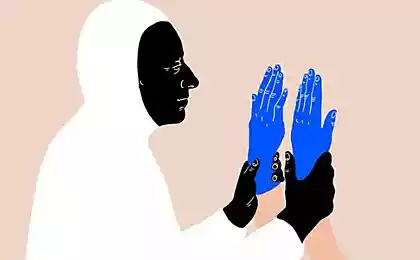21
8 Signs of a Superior Complex and How to Get Rid of It
How to Recognize the Hidden Tyrant in Yourself and Free Yourself from His Power

Imagine a person who walks into a room and immediately begins to evaluate everyone present, mentally placing them on the shelves of intelligence, success and significance. He smiles, nods, engages in conversation, but inside he has an invisible superiority calculator running. Familiar? Maybe that person is you.
The superiority complex is not just an inflated self-esteem. It is a complex psychological defense that masks deep fears and insecurity under the armor of ostentatious grandeur. And the most insidious thing about him is that he destroys exactly what he's trying to protect -- our relationships with people and with ourselves.
What lies behind the mask of greatness?
Psychologists have long established a paradoxical connection: the more a person demonstrates his superiority, the deeper his inner doubts. It’s like an iceberg – the visible part is striking in its size, but the bulk of the mass is hidden under water. The superiority complex is often the flip side of the inferiority complex that a person desperately tries to make up for.
True power does not need constant proof. It is just like breathing or the beating of the heart. But ostentatious power requires constant feeding of other people's admiration and recognition.

8 Unobvious Signs of a Superior Complex
1Chronically comparing yourself to others You can’t just rejoice in someone else’s success – instead, you automatically look for what you’re better at. A colleague got a promotion? "He just has connections." A friend bought a new car? "Mys is more economical." This is not pure envy; it is an obsessive need to regain superiority in any situation.
2 Allergy to your own mistakes Any mistake is perceived as a disaster that threatens your entire identity. You’re willing to argue to the point of hoarseness, shift responsibility, pretend that nothing happened — anything but admit, “Yes, I screwed up.” In your picture of the world, you are the one who is not wrong.
3 Subtle depreciation of others “Well, this is obvious”, “Everyone knows that...”, “Don’t you understand?” – such phrases pour out of you unconsciously. You don’t want to offend, but you always make it clear that you are on a notch higher. It's like an intellectual snobbery that manifests itself in little things.
4 Fear of showing weakness To ask for help is to admit defeat. You’d rather suffer alone than show that you don’t know or can’t. Vulnerability seems like a dangerous luxury that only weak people can afford.
Try an experiment: during the week specifically ask for help in trifles - ask for directions, ask to explain something simple, admit that you do not know something. Watch your feelings and the reactions of others.
5 You don’t know how to be led in conversation. Always have to say the last word, direct the conversation in the right direction, show your expertise. Even when you are silent, internally prepare a brilliant line that will put everyone in their place.
6 Feeling special privilege Rules for everyone, but not for you. You can be late, interrupt, ignore the queue because your time is more expensive, your business is more important. This is not evil intent, it is a sincere conviction of its special significance.

7 Painful reaction to someone else’s success When someone achieves success, you feel not joy, but threat. Inside rises a wave of irritation, envy, desire to find a flaw in someone else’s achievement. “Why not me?” – this question torments you more often than “How great!”
8Chronic feelings of underestimation Even when you get recognized, you feel you deserve more. People just don’t understand your true value. This thought haunts you constantly and poisons even moments of triumph.
How to Free Yourself from the Tyranny of Your Ego
Step 1: Honest confession The first and most difficult thing is to admit that there is a problem. Not for a tick, not for beautiful words in therapy, but for yourself, alone with yourself. “Yes, I have this trait and it keeps me from living.”
Step 2: End internal competition Your value does not depend on how much you outperform others. Start noticing comparison moments and consciously switch to something else. Instead of "I'm better than him at this," think "I wonder what I can learn from him."
Step 3: Practice vulnerability Start small – admit to someone you don’t know something. Ask for advice. Share your doubts. Vulnerability is not a weakness, it is the courage to be real.
The strongest people are not those who never fall, but those who rise beautifully and learn from their mistakes. Their strength lies in flexibility, not rigidity.
Step 4: Develop empathy Learn to see people not as competitors but as allies. In every conversation, ask yourself, “What does this person feel?” What's bothering him? The more you focus on others, the less room there is for toxic self-admiration.
Step 5: Find a source of self-esteem within yourself that is independent of comparison. Your principles, your values, your ability to grow is what makes you valuable. Not achievements, not superiority over others, but your unique ability to be yourself.
When it is necessary to consult a specialist
If a superiority complex seriously affects your life - destroys relationships, interferes with your career, causes constant stress - do not hesitate to consult a psychologist. Often the roots of this problem go deep into childhood, to the moments when you were compared, underestimated or, conversely, overextended.
Asking for help is not a surrender, but a wise strategic move. Successful people are able to delegate tasks, including the task of working on themselves to professionals.
Conclusion: From Excellence to Authenticity
The superiority complex is not a sentence, but a challenge. The challenge of becoming more mature, wiser, more human. The path from ostentatious grandeur to true power is not easy, but it is worth it. At the end of this journey, you will find something much more valuable than the admiration of others – inner peace and sincere relationships with people.
And remember, the greatest people in human history are not those who think they are superior, but those who serve others. Their greatness is not that they rose above the crowd, but that they raised the crowd to their level.
Glossary of terms
The superiority complex psychological protection, manifested in demonstrative behavior aimed at emphasizing their own importance and superiority over others.
The inferiority complex A deep sense of inadequacy and inferiority, often offset by outward manifestations of superiority.
Empathy. The ability to understand and share other people’s emotional states and put yourself in their place.
Vulnerability - willingness to be open to emotional impact, to recognize their weaknesses and imperfections.
Intellectual snobbery A form of superiority based on demonstrating one’s knowledge and degrading the intellectual abilities of others.
Psychological protection unconscious mechanisms aimed at reducing emotional discomfort and anxiety.























